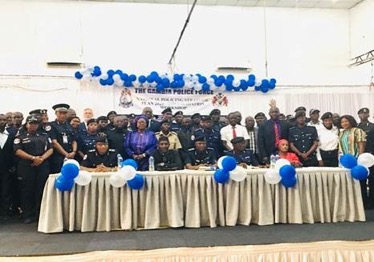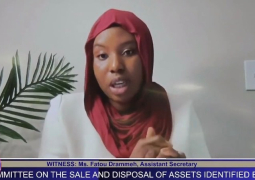
The day-long training was held to guide the operations of GPF and ensure that the rules governing law enforcement are responsive to society's needs, protect public safety, and uphold the rights and dignity of all individuals.
The information imparted during the training was strategically to help GPF deliver its services more effectively and efficiently.
Speaking at the event, Assistant Inspector General of Police (AIGP) Demba Sowe, expressed delight and appreciation to all those who contributed to the development of the initiative including dedicated officers, partner agencies, civil society organisations, the academicians and the communities they serve to entrench and enhance the practice of human security.
“In today's dynamic security landscape, characterised by evolving threats and challenges, the importance of strategic foresight cannot be overstated,” Sowe said. “Our ability to anticipate emerging trends, leverage technological advancement, and foster partnerships is paramount in ensuring the effectiveness and relevance of our law enforcement efforts.” He added: “This National Policing Strategic Plan we are about to validate is not merely a document, it is a blueprint for action.”
AIGP Sowe mentioned that the Plan has a clear objective, and identifies key priorities and actionable strategies to tackle various complex issues.
The issues range from transnational crime and terrorism to cybersecurity and community policing, he said, adding that the Plan reflects the firm's commitment to uphold the principles of accountability, transparency, respect for human rights, and the rule of law in all their endeavours.
Assan Tangara, Permanent Secretary at the Ministry of Interior, commended the GPF's commitment to serving and protecting communities with integrity and professionalism. He emphasised the need to inform the policing environment of factors that could impede or contribute to the success of the document.
“Increasing community policing initiative is one of this strategic plan’s top focuses,” Mr Tangara said. “We understand that a solid relationship between the GPF and the communities is essential to efficient policing. We can work together to address the issues affecting our neighbourhood and create safer, more resilient communities by promoting trust, communication, and teamwork.”
PS Tangara stated that the plan aims to improve the capacity and capabilities of the GPA. “This includes investing in training, technology, and infrastructure to provide officers with the tools and resources they need to perform their duties effectively and efficiently,” he further stated.
He also emphasised the significance of promoting transparency, accountability, respect for human rights, and adherence to the principles of democracy within the GPF.





